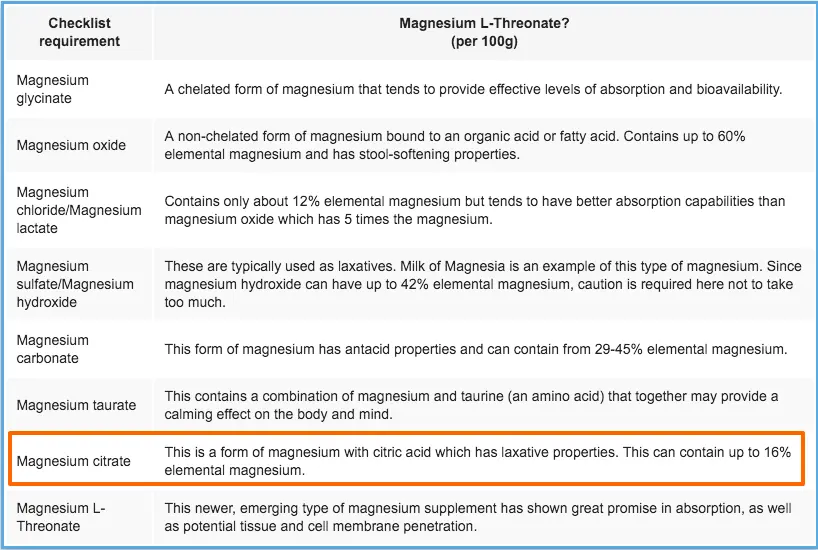So you’re interested in using magnesium Citrate?
Maybe you’ve heard that magnesium can help with weight loss, or maybe you found out that your serum levels are low.
Either way, it doesn’t matter because the truth is that magnesium is critical for optimal health and is involved in a number of metabolic pathways in the body (1).
The deficiency of this critical nutrient may result in a number of negative symptoms.
That’s the bad news.
The good news is that replacing this nutrient isn’t very difficult.
Below we are going to go over 9 powerful reasons you should consider using magnesium citrate, backed by science of course, including how I use this in my practice for maximum benefit.
Let’s dive in…
9 Reasons to Consider Supplementing with Magnesium Citrate
Before we talk about the many benefits of magnesium citrate we need to establish some basics.
First:
We need to understand what magnesium citrate actually is.
Magnesium is a critical nutrient and citrate is the portion that magnesium is bound to.
Magnesium can be bound to different compounds to either increase absorption, decrease absorption, or alter how magnesium gets into your cells.
Magnesium citrate is special because much is absorbed after ingestion.
Much of the magnesium bound to citrate remains in the gastrointestinal tract which has special implications for GI function.
Because magnesium can act on smooth muscle it can improve the regularity of bowel movements (making it a potent treatment for constipation).
But let’s be clear:
The benefits of Magnesium citrate come from the magnesium portion (the same is true of other forms of magnesium), so realistically you can still get much of the benefits that magnesium citrate provides while using other forms of magnesium.
Except magnesium bound to oxide. Don’t use this low-quality form of magnesium!
Below I’ve attached a list of magnesium formulations with different binding components:

How to Properly Supplement with Magnesium
So how should you use magnesium for the maximum benefit?
When we talk about replacing any nutrient we are most concerned with the quality of the supplement but also the dosing.
If you take a low-quality supplement (as in the case of magnesium oxide) you won’t get the maximum absorption and thus your benefit will be limited.
Likewise, if you use a dose that isn’t high enough you will not experience the benefits I am discussing here in this article.
When it comes to magnesium citrate there are some general guidelines you should follow:
- Base dose on your symptoms (not on your serum levels)
- Dosages of up to 2,000mg daily may be required
- Titrate dose based on your bowel movements (increase your dose to cause loose bowel movements but never diarrhea)
- High dosages may be required for up to 6 months to replete cellular levels of magnesium (note that serum levels of magnesium do not accurately reflect intracellular levels)
- Certain hormone imbalances (such as hypothyroidism (2)) cause changes in the kidneys which influence serum and cellular magnesium levels, dosing should be adjusted for these conditions
- Magnesium is best taken at night because it can provide a calming effect on the brain and body
- Avoid taking magnesium with other oral medications (especially thyroid hormone)
- Patients with poor diets may need to supplement for longer and more sustained periods of time
Use these as guidelines when supplementing with magnesium and remember that it may take several weeks (up to 4-6 weeks) before you notice an improvement.
Below I’ve included a review of my favorite magnesium supplement (the one I use in my practice) and the one that I’ve found the most success with.
This supplement is a combination of both potency and purity and does not include any extra fillers, dyes, or binders.
How to Supplement with Magnesium Citrate
How to Use
- Start at 200mg every night
- Titrate the dose until you have 1 loose bowel movement in the morning
- Dose ranges from 200mg-2000mg per day
Now that we understand how to supplement with Magnesium citrate let’s jump into the many benefits this nutrient might provide:
#1. Magnesium Helps with Weight Loss
I’ve written about this extensively in this post, but it’s worth going over a few important points here.
Magnesium citrate may help with weight loss through a number of mechanisms:
First:
Magnesium itself has a positive influence on insulin signaling (3) and may help in reversing insulin resistance.
If you’ve spent time on my blog you know that insulin is probably one of the most common hormone imbalances leading to weight gain and weight loss resistance.
Given that up to 50% of the US population has either pre-diabetes or diabetes (both conditions of insulin resistance), there is a good chance you fall into this category.
That means taking magnesium may help improve your insulin levels and ultimately lead to a state where weight loss is more easily achieved.
Second:
Magnesium citrate may help to increase cellular energy levels and ATP production via mitochondrial pathways (4).
Studies have shown that adding magnesium may improve energy production during exercise resulting in a longer and more sustained caloric burn.
This change in energy production may be responsible for a reduction in symptoms of fatigue and indirectly lead to increased activity levels.
Higher energy production = higher resting energy expenditure = more calories burned at rest
This benefit assumes that the person supplementing is deficient in magnesium, however.
So taking magnesium if you have sufficient cellular and serum levels may not help with weight loss in this population.
Third:
Magnesium citrate helps to reduce total body water and stool through its laxative-like effects on the GI tract (5).
This improvement in regularity may also bring about changes in your microbiome and microbiota (6) which may have a positive effect on energy balance as well.
Remember though that this benefit does not necessarily provide a reduction in total fat mass, which is what people want when they are looking for weight loss.
The temporary loss in water weight may move the scale, but may not do much for the reduction in fat in your body.
The combination of these benefits probably all contributes to weight loss that is seen in some patients who supplement with Magnesium Citrate.
Remember, for the best results it’s necessary to combine magnesium supplementation with other lifestyle changes including diet, exercise, and stress reduction.
#2. Magnesium Improves the Quality of your Sleep and Helps Treat Insomnia
Magnesium supplementation has been shown in many studies to help improve both the depth and quality of sleep (7).
This is important for several reasons:
A general lack of sleep has been associated with multiple medical conditions including an increased risk of developing diabetes, a reduction in immune system function (8), and an increased level of inflammatory markers (9).
Yikes.
A lack of sleep is described as less than 8 hours of restful and high-quality sleep each night.
How many of you fall into that category? Not many I’m sure.
What’s important is that Magnesium can help increase the depth of your sleep and actually reduce your risk of these conditions.
This may be yet another reason why magnesium citrate may help with weight loss because a general lack of sleep is also associated with weight gain (10).
You can use magnesium to help improve your sleep by taking it 30-60 minutes prior to bedtime.
Use doses of at least 300-400mg at night for the full effect.
In my experience, patients who tend to get an improvement in sleeping habits with the use of magnesium tend to have an “over-active” mind or a mind that they can’t “shut off” at night.
Having said that many patients still notice improvements with magnesium supplementation.
How to Supplement with Magnesium Glycinate
How to Use
- Start at 100-150mg per day and take at night
- Titrate dose until you have 1 loose bowel movement in the morning (you may require higher doses of magnesium glycinate because more magnesium is absorbed)
- The dose ranges from 300mg-600mg per day
Best Place to Buy
#3. Magnesium helps Treat Constipation
As was mentioned previously one of the most well-known benefits of using magnesium citrate is its ability to help improve bowel movement regularity.
The citrate components help magnesium stay in the bowels longer, helps relax smooth muscles, and help move stool through the GI tract.
To get this benefit with magnesium citrate you may need to use dosages as high as 2,000mg per day.
To start supplementation simply start with 200-300mg taken at night (30-60 minutes prior to bedtime) and increase your dose by 100-200mg per night until you have loose stools in the morning.
If you develop diarrhea during this process then you should back down on the dose.
While magnesium citrate will most definitely help you with bowel movements it’s best to focus on the CAUSE of your constipation.
Magnesium citrate acts as a way to increase bowel movements but doesn’t necessarily treat the underlying cause of your constipation and may just mask the symptom.
Having said that it is important to have consistent bowel movements because stool helps eliminate potentially harmful bacteria and other breakdown products in your body.
#4. Magnesium Helps Calm the Mind and May Reduce Symptoms of Anxiety & Depression
Magnesium deficiency has been associated with depressive symptoms (11).
What’s interesting is that this connection seems at least in part to be due to the changes in the microbiome (12) due to magnesium-depleted foods.
Magnesium supplementation can be used as an adjunct to other treatments for depression.
That means you can add magnesium to anti-depressants and other medications to get this benefit.
Low magnesium has also been associated with changes to the HPA axis which may result in symptoms of anxiety (13).
The addition of magnesium can help to “calm down” the mind, reduce symptoms of anxiety and help combat depression.
For optimal results using magnesium bound to threonate might even be more powerful than using magnesium bound to citrate.
#5. Magnesium can Help Treat Chronic Migraines
Do you suffer from headaches or even migraines?
Did you know that taking magnesium every day can actually help PREVENT migraines?
Studies show that taking magnesium can actually act as prophylaxis against migraines (14) (without aura).
How this works is not entirely understood but probably has to do with multiple factors:
Believe it or not, doctors still aren’t exactly sure what causes migraines (we think it has to do with vascular changes in the arteries/veins).
With that in mind, it is felt that magnesium can help relax the smooth muscle which controls the diameter of the arteries and veins which may reduce the frequency that patients experience migraine headaches.
The moral of the story here is that if you suffer from migraine headaches (without aura) using magnesium supplementation may help to reduce the total number of migraines you experience.
Note that in order to prevent migraines magnesium should be taken every day regardless of serum levels.
#6. Magnesium May Help Increase Energy Levels
We touched on this previously but because magnesium is involved in mitochondrial pathways (15), a deficiency in magnesium may result in the subjective symptom of fatigue or low energy.
Your mitochondria produce energy for your entire body in the form of ATP.
The production of ATP occurs (mostly) in the mitochondrial and requires certain cofactors, enzymes, and nutrients for optimal production.
A deficiency in critical enzymes may reduce energy production slightly, and this reduction in energy production is what is subjectively felt as fatigue.
Of course, other factors may influence energy levels, but if you are suffering from fatigue AND you have low serum levels of magnesium then supplementing with magnesium may ultimately help to improve your energy levels.
Again, supplementing for low energy may depend on a combination of serum magnesium levels, and for the best benefits magnesium should be taken daily.
#7. Magnesium Helps Reverse Insulin Resistance
We touched on this earlier in how magnesium citrate supplementation can help with the weight loss section, but it’s worth expanding on here…
Magnesium helps your body become sensitive to insulin.
If you recall the role of insulin is to help push blood glucose (sugar) into your cells.
High levels of insulin shove glucose into your cells (including fat cells) causing insulin resistance at the receptor level.
High levels of insulin cause weight gain due to the growth of fat cells and result in an increased risk of multiple medical conditions including cardiovascular disease (16).
What you may not realize is just how common the condition of insulin resistance actually is.
The number of patients with insulin resistance continues to grow and with it, the risks and complications of the disease do as well.
If you have known issues with blood sugar, diabetes, or pre-diabetes then you have insulin resistance.
If you do I would recommend reading through this article and considering the use of multiple supplements and dietary changes to help influence your insulin sensitivity.
Of these supplements that help reduce insulin resistance, magnesium is front and center.
#8. Magnesium Helps Reduce Muscle Cramps, Twitches, and Muscle Aches
Have you ever experienced a Charley horse?
A Charley horse is a painful muscle spasm (usually in the lower legs) that usually doesn’t subside until it is stretched out (another painful endeavor).
These muscle spasms can be triggered by low levels of magnesium.
In addition to these muscle spasms, magnesium can help reduce muscle twitches (I’m talking about those pesky eye twitches) and other muscle aches and pains (17).
If you are experiencing muscle cramps, aches, or pains then supplementing with magnesium citrate may help to reduce these symptoms.
A word of caution:
Diarrhea can actually induce magnesium deficiency, so high doses of magnesium citrate may be counterproductive if your magnesium deficiency and muscle cramps are caused by loose stools.
#9. Magnesium may Help Lower Blood Pressure
Several studies have shown that taking magnesium can actually help to reduce blood pressure levels and act as an anti-hypertensive (18).
This is felt to be mediated through a combination of factors:
First magnesium helps to relax smooth muscles. As the diameter of your arteries increases blood pressure will necessarily fall.
In addition, magnesium helps to increase nitric oxide levels which has the same effect.
In addition, magnesium acts as a natural calcium channel blocker (19) to reduce the force of contraction of the heart.
If you have hypertension you may know that many antihypertensives actually target the calcium channel as well.
The thing to realize about magnesium supplementation for hypertension is that it may not work for everyone.
However, it is easy enough to add magnesium to your regimen and then monitor your blood pressure.
I would not, however, recommend that you go off of your anti-hypertensives in favor of using magnesium without consulting your physician.
Recap & Final Thoughts
There you have it:
9 powerful benefits to using magnesium citrate that is backed by scientific evidence.
If you didn’t have reason to consider using magnesium prior to this article I hope you have a good reason now!
Not only is magnesium involved in multiple enzymatic pathways, but it’s also a common nutrient deficiency found in many patients.
Now it’s your turn:
Are you using magnesium citrate?
Has it helped you in any of the categories above?
Why or why not?
Leave your questions or comments below!











Interesting article and many of the issues you wrote about describes my challenges. WhAt do,you recommend as a starting or optimal dosage to start off with? If it was to be increases in what increments would you recommend? How would you know it’s too much?
Hey Kat,
Generally 150mg is a good starting dose and increasing by 150mg each night until you have a healthy bowel movement in the morning is the best way to titrate the dose. You’ll know if you get too much because you may develop diarrhea. Dosing can range from 150-2,000mg each day.
I’m curious how I would fit magnesium into my nighttime routine? I take a few Meds at bedtime ( Progesterone, Trazodone, Gabapentin ) all are very low dose for sleep. Will taking the magnesium effect the absorption of these meds? Thanks for any insight!
Hey Susan,
If you take your supplements several hours away from your medications there really shouldn’t be an issue with absorption.
what about topical magnesium… spray and salts for bath?
Hey Brenda,
You can use trans dermal magnesium if you’d like, but you won’t get all the benefits listed in this article using them by that route.
Something I found with magnesium oil, is even though they claim 90% absorption in half an hour, apparently it is far from that. I used to use it after I had a good bath to give it clean skin to absorb through, plus move the site I put it on around, as the absorption transference depends on how little is in a patch of skin. How much transfers from the skin down and throughout the body, I don’t know. So, you should be mindful it is not going into your gut, and you might need other forms. I also have been told of different action with different magnesiums.
Hi, I’m Wayne.
I enjoyed reading your page, but I did not find magnesium citrate to be the best form for sleep. Of myself, and others, I put onto it with sleep issues, it actually made it worse. This maybe only some people, but I have found other types of magnesium worked really well instead. Magnesium is used in the manufacture of hormones, and taking a big dose of magnesium citrate at night seems to bring up the hormones in these people, and make them more lively. I tell them to try taking most of the magnesium in the day/morning and over the days/weeks you may start to feel naturally sleepy when the sun goes down, and to try only one capsule at night hours before bed. The production of melatonin only requires a bit of available magnesium. So a small dose seems to help (and even a tiny pin head pinch of tryptophan involved in the melatonin pathway).
I have tried magnesium oil, a little on the rump under your clothes to stop it sticking to everything, and it works really well. I can’t remember the other forms of magnesium I tried, but I think magnesium oxide also worked at night. I find some formulas of zma helpful, as they have magnesium and a few extras that may help some people’s sleep quality. Actually I’m developing a cocktail of things to help getting to sleep and sleep quality. There seems to be a bit of a trick to it. But when magnesium and such fail to get me tomsleep, I take some vitamin c (one of those cheap orange speckled artificially sweetened ones with sodium ascorbate and ascorbic acid). Then the other things start working and I start to feel an and you head starts drifting. But I don’t know how little us needed, as too much will rebound. There are a handful of other things as well.
I have actually found this trying to find why mag citrate has this effect. Maybe you can advise me as to why it affects certain people like this? I am trialing mag citrate again at the moment. I have tried big dose in the day his time, and not as sleepy at night, and bad sleep with weird extended stressful dreams this round.
I take up to about 900mg magnesium citrate (plus 250mg mag oxide combined with 500mg calcium) every day because of chronic constipation. I understand that it is important to take calcium when taking magnesium. I find it sooooooooo helpful with the constipation problem, and I also have increased energy and sound sleep. I would like to know if this is okay long-term. I’ve tried so many things but don’t know what is causing the constipation problem which I have had since childhood. Any suggestions?
Hi Nim,
It would be best to try and find the source of the constipation and then treat that as opposed to masking the symptom with high doses of magnesium.
I recently had a double mastectomy. The pain medication has caused constipation. A nurse suggested magnesium citrate. But I am starting my hormone blocker (Femara/Letrozole) today. Will these interact with each other?
Hi Eluna,
They shouldn’t interact with one another.
Dear Dr Childs:
I take 2000 mg of magnesium citrate, and consume very little by way of dairy products except a piece or two of milk chocolate (but eat other foods that contain calcium: tofu, oranges, greens, sesame,etc). I take the magnesium because I have muscle spasms at night and nerve tingling: possibly restless leg syndrome, which leaves me with extreme stiffness during the day. The magnesium citrate taken in the morning helps a great deal. My question is: is this dose if magnesium citrate adversely affecting calcium absorption? If calcium intake is low (because of no dairy), can high doses of magnesium be a problem?
Many thanks.
I have a magnesium deficiency and I ordered a magnesium supplement with citrate and malate in it. I have trouble sleeping at night. Would it be best to take 400mg at night instead of splitting the doses up?
Hi Niki,
That shouldn’t be an issue!
Taking magnesium oxide – excellent to relieve constipation. Took magnesium citrate when I was unable to find magnesium oxide and constipation came back. As soon as I started oxide, regulation happened.
However, this is important and I did not read this in benefits:
Does magnesium citrate cure restless leg syndrome, tingling and charley horse? It had all dissappeared and now it came back. Maybe no correlation, but who knows! Please respond to my email and please, do not publish email
Hi Annia,
All forms of magnesium provide roughly the same benefits as they all provide magnesium to the body. Where they differ is in what they are attached to and how that compound impacts how well the magnesium is absorbed (or where it is absorbed). Magnesium oxide is the cheapest form of magnesium and usually provides the least amount of magnesium per unit compared to other formulations. Magnesium citrate tends to stay in the gut where it helps with constipation which is why it’s often used for that purpose.
Hey Dr Westin, I have a question for you 🙂 I have been diagnosed with sleep apnea, and occasional, mild Afib, is it safe for me to take Magnesium Citrate at night, for occasional bouts of constipation? I’m not on any meds on a regular basis, only on an as needed basis do I take Metropolol, very low dose, Gabapentin 300 mg as needed for pain and occasional cramps and Antivert for inner ear, and an occasional Tylenol.